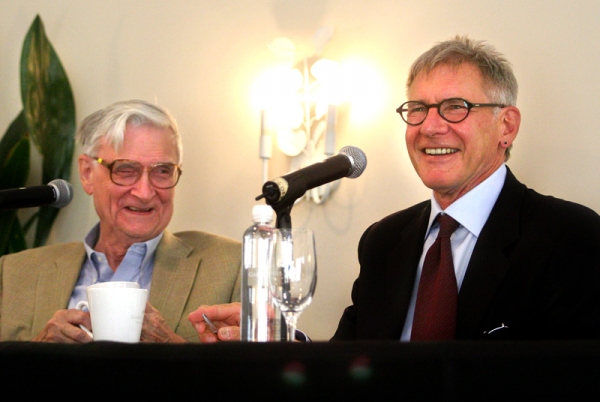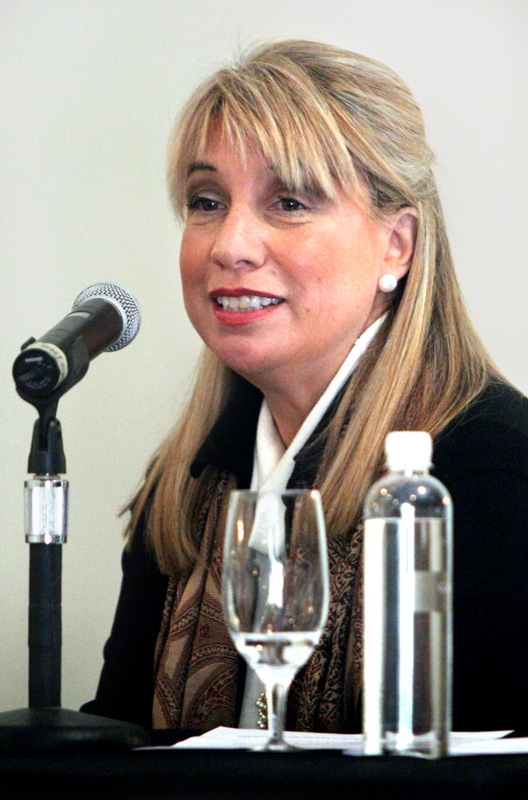There was no bullwhip and no rakish fedora when Hollywood icon Harrison Ford came to Palo Alto Friday. Instead the actor and conservationist joined Pulitzer-prize-winning environmentalist Edward (E.O.) Wilson at the Garden Court Hotel to announce a new literary award.
The first $10,000 PEN/E.O. Wilson Literary Science Writing Award, with funding by Ford and Wilson, will be given next year by the PEN American Center, a branch of the world's oldest international literary and human-rights organization.
"We recognize that scientists and fiction writers have a common starting point -- the imagination, the wild surmise of what might be," said Wilson, a Harvard University professor who is considered the founding father of the fields of sociobiology and biodiversity.
The award isn't just a literary one, both Ford and Wilson said. Its intent is to effect change in the world by marrying the power of literature with scientific information.
The main problem in modern society is that the challenges people face are so complicated and systems have become increasingly complex, Wilson said.
Literary science writing can foster an understanding of how systems work, which in turn could spur problem solving, he said.
Ford met Wilson when both served on the board of the nonprofit Conservation International, where Ford is currently a vice chair of the board.
"I was always very impressed -- and more importantly, entertained -- by Ed's perspective and way of presenting information," Ford said. "He has the capacity of a poet and the clarity of a scientist."
"I was engaged and moved by ... 'The Creation,' which is a beautiful book that argues for science to religion and engages both fields in a warm and wonderful way."
Ford said he was glad to provide initial funding for the award.
"I'm happy to do whatever Ed tells me to do. So to that end, I found a clean shirt and a way to get here," said Ford, dressed in a dark blue suit and maroon tie.
"I thought Indiana Jones doesn't take orders from anyone," Wilson quipped.
The two were joined by Rebecca Costa, a former Silicon Valley marketing executive who later bought a butterfly conservation area in Big Sur and has penned the book "The Watchman's Rattle: Thinking Our Way Out of Extinction," for which Wilson wrote the forward.
Wilson helped promote Costa's book Thursday night at Kepler's in Menlo Park and was also in town for a Friday fundraiser for his organization, the E.O. Wilson Biodiversity Foundation.
The idea for the PEN/E.O. Wilson Literary Science Writing Award first surfaced in March in a discussion with Steven Isenberg of PEN, said Neil Patterson, chairman and president of the E.O. Wilson Biodiversity Foundation. One call to Ford, a Foundation board member, was all it took to gain funding for the first three years.
Ford spoke about the need for people to understand the humanity behind science, rather than equating science with jargon and dry language. Topics like global warming need to be communicated about "with passion and certitude."
He likened good science writing to storytelling and referred to his own craft of acting.
"Everyone understands that the principal engine is the story. Many in my profession believe the character is primary, then the story. I believe the other way around," he said.
"People want a story," Wilson said. "They respect nonfiction, but they read novels."
International PEN (poets, playwrights, essayists, editors and novelists) was founded in 1921 in direct response to the ethnic and national divisions that contributed to the First World War. The organization gives annual awards, including the PEN/Nabokov Award, the PEN/Faulkner Award for Fiction and the Ernest Hemingway Foundation/PEN Award for First Fiction.



Comments
Waverly Park
on Oct 18, 2010 at 2:36 pm
on Oct 18, 2010 at 2:36 pm
Good to get away from Calista for a change, huh, Mr.Ford?
another community
on Oct 18, 2010 at 2:54 pm
on Oct 18, 2010 at 2:54 pm
It's a great idea and I appreciate the donation that Harrison Ford has made. In the world of books and in-depth learning, it always helps when the book has been written in a literary way, to make the reading both informative and enjoyable. Rachel Carson would never have made the huge impact she did in writing Silent Spring, effectively launching the environmental movement, had her writing not been as much poetry as biochemistry.
Unfortunately, in today's world, the real crisis is not in the number of readible books available on critical scientific subjects but rather in the number of authoritative scientists who can speak articulately in sound-bites about complex, cross-disciplinary topics, such as climate change. Life and planet-threatening issues are often tossed about in the media in blitz interviews, where a scientist is pitted against a mud-slinging spokesperson and their two statements are weighed equally as if "opinions." In this format, scientists who have spent entire careers in labs and in the field are at distinct disadvantages against media showmen. Yet, people will listen to the blitz interview and decide how to vote! They are not stopping to read the authoritative, if literary, scientific book.
What's really needed is to have a program or a prize endowed that helps to train and motivate scientists to develop the skills to stand up for what their science research means against the likes of a Glenn Beck. We need scientific spokespeople who can hold their own against a nay-sayer who seeks sensationalism rather than facts! This is the state of our media and the source of much public information. Sadly, the foremost scientist both cognizant of this crisis and also capable of holding his own in the media, Dr. Stephen Schneider, recently died, leaving the scientific world much poorer as a result.
Monta Loma
on Oct 18, 2010 at 5:57 pm
on Oct 18, 2010 at 5:57 pm
I learned about nanotechnology from one of Michael Crichton's novels ("Prey"), as well as the chaos theory in his book, "Jurassic Park." I'd have never read about these scientific concepts any other way, so I'm all for, as stated in the article, marrying literature with science information. A few years ago I taught a college course called "history in literature," and it was a fun and creative way to study history. One of the books used, for example, was Harriet Beecher Stowe's "Uncle Tom's Cabin." The use of fiction is highly effective and one of many ways to teach to a subject.